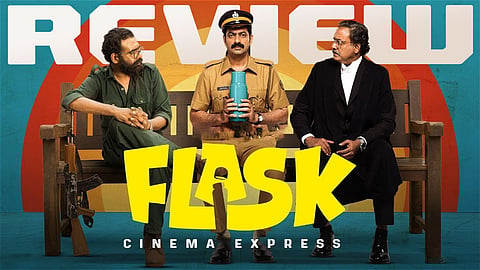Flask Movie Review: A light-hearted comedy anchored by earnest turns
Flask(3 / 5)
Rahul Riji Nair's Flask opens on a light note, with constable Jyoti Kumar taking the stage at a temple ground to sing Ouseppachan’s classic melody ‘Nee En Sarga Soundaryame’, still in his police uniform because the troupe manager forgot to bring the shirt he was meant to change into. Played with warmth and gentle humour by Saiju Kurup, Jyoti is a man who once dreamt of singing, but now finds himself in khaki more out of circumstance than choice. A blunder on duty, out of his love for the likes of the melodies of the legendary Johnson master, puts him at risk of suspension or a tougher posting. Instead, he is assigned as the Personal Security Officer to District Judge Venkitesh Balaji, a man as rigid as the law he serves. Among the force, this role is often mocked as 'Flask', a reference to the flask typically seen hanging from the PSO’s shoulder as they follow the judge everywhere. Jyoti’s easy-going manner and misplaced priorities soon clash with the order and precision expected of him. It is a pairing ripe for conflict, and the film draws out their dynamic with grace and understated wit.
Flask is not the sort of comedy that chases punchlines, but rather the kind where character quirks draw out laughter. Whether it is Jyoti’s tone-deaf excuses or the disapproving silence of Venkitesh, the humour arrives in subtle waves. The supporting cast adds to this lived-in texture, especially Aswathy Sreekanth as Jyoti's wife Nisha and Balachandran Chullikkad as Jyoti’s father, whose quiet disappointment speaks volumes. He had always hoped his son would follow his musical path, not end up guarding people with guns. What truly sets Flask apart, though, is how it shifts gears. Midway through the film, when a Maoist group abducts both Jyoti and Venkitesh, demanding the release of their jailed leader, the film changes tone but not temperament. It doesn’t explode into loud drama, nor does it turn self-important. The forest setting becomes a space of reflection and fear, where both men, stripped of their designations, begin to see each other more clearly. The Maoist leader Ganeshan, played by Sidharth Bharathan, is written as a man shaped by trauma, but the character arc stays within familiar territory. The film does attempt to address how such revolutionaries are formed, and how systemic violence creates more violence in return. But these political undercurrents remain mostly at the surface level.
What truly stays with you is the gradual softening of Jyoti and Venkitesh toward each other. Suresh Krishna plays the judge with a certain rigidity that works, even if the character feels one-note for most of the film. It is only toward the final stretch that we begin to see a man behind the robe. Their exchanges in captivity are not dramatic but honest, often coloured by fear, memory, and a grudging respect that develops over time. Jyoti’s growth, from a careless constable to someone who begins to value his position and life, feels earned. There are moments of vulnerability that Saiju plays with an unaffected charm, making Jyoti one of the more endearing everyman cop characters in recent memory. There is also an echo here of his earlier turn as a singing policeman in Antakshari, a film where music was tethered to dread rather than nostalgia. Yet, despite the thematic overlap, Saiju brings a distinctly different energy to Jyoti. This is not a man tormented by melodies, but someone clinging to them as a fading comfort, as if they are all that remain of the life he once imagined for himself. The rest of the supporting cast also play their parts with conviction, most of them subtly shaping the dynamics between Jyoti and Venkitesh.
Technically, Flask is neat. The cinematography, particularly in the forest sequences, captures both beauty and claustrophobia without ever overstating itself. Editing, too, deserves mention. At just under two hours, the film is deftly packed, leaving little room for boredom. That said, not everything clicks. The final action stretch, involving a shootout, feels too convenient, almost like a narrative shortcut to wrap things up. After the organic rhythm of the rest of the film, this climax feels slightly at odds. Yet, the closing moments bring the film back on track. There is a quiet dignity in how Jyoti accepts his uniform, not as a burden but with a sense of self-worth he had long been missing. With its simplistic approach, Flask does not set out to reinvent the wheel, but it knows its lead characters, stays close to them, and never lets go of its emotional compass. While the film falters in making its political notes more compelling, its emotional core remains strong, woven consistently with light humour. In the end, this is not a film about heroes or rebels, but about ordinary people caught in extraordinary circumstances, slowly learning what it means to stand by someone. And in that quiet reminder, it leaves you with a smile.

